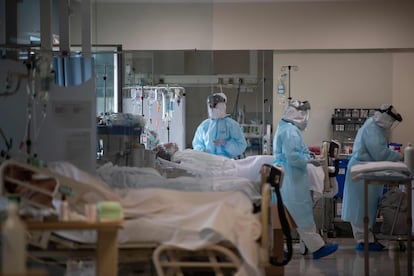Daily coronavirus deaths in Spain fall to 565, taking official total over 20,000
According to figures released Saturday by the Health Ministry, there have been 191,726 registered infections, and 74,662 patients discharged from treatment

The number of daily coronavirus deaths in Spain came in at 565 on Saturday, a slight fall from Friday when 585 victims were reported for the previous 24-hour period.
According to figures released by the Health Ministry, a total of 20,043 Covid-19-related deaths have been recorded in Spain since the outbreak began, with 191,726 confirmed infections, up 4,449 on Friday. Yesterday’s rise in confirmed infections was slightly higher, at 5,252. A total of 74,662 coronavirus patients have been discharged from hospital after recovering, which is 39% of total cases.
The Health Ministry has this week been revising the statistics recorded so far, after the central government sent an order to Spain’s 17 regions in a bid to homogenize the often chaotic reporting from each healthcare system.
New infections should be viewed with caution, given that more testing is currently being rolled out across Spain, meaning that cases that previously had gone undetected are now forming part of the official statistics.
What’s more, Fernando Simón, the director of the Health Ministry’s Coordination Center for Health Alerts, explained at the government’s daily press conference on Friday that there had been a “discrepancy” in the figures provided by one of Spain’s 17 regions, which he did not identify, prompting the revision of Thursday’s figures.
The number of daily fatalities came in at 551 on Thursday, 523 on Wednesday, 567 on Tuesday and 517 on Monday, indicating a leveling out of the figures but no clear fall for the last week. The peak of daily deaths was seen on April 2, when there were 950 Covid-19-related fatalities.
The positive evolution of the curve that was seen last week has now halted. Epidemiologists and government advisors have been warning that for confinement to be relaxed, progress will need to be made in terms of the data – something that has not been happening over recent days.
Spain has been on lockdown since March 14, with the current state of alarm approved by Congress due to expire on April 26. But Prime Minister Pedro Sánchez has already warned he expects to extend the conditions by another two weeks, until May 10.
Speaking on Saturday at the government’s daily coronavirus press conference, Fernando Simón explained that in the last three weeks, the number of the most reliable coronavirus tests, known as PCR, have doubled. From the roughly 200,000 that had been carried out in the week beginning March 23, to more than 400,000 this week.
What’s more, serological tests must now be included in the daily statistics, data that is being added by the Health Ministry in a separate column on its daily report and that includes people who are not actively suffering from the Covid-19 disease, but likely had it weeks or months ago, given that these tests detect antibodies in the blood rather than the actual virus.
At least 1,194 of new cases detected in the last 24 hours have been discovered via this kind of test, but they are not included in the aforementioned 4,499 new cases.
Interpreting the data
According to Fernando Rodríguez Artalejo, a professor in Public Health and Preventive Medicine at the Autonomous University of Madrid, the number of cases should almost be disregarded for the coming days , given the changes in criteria that the government is incorporating. The number of deaths, he warned, should also be viewed with caution. “They don’t have to progress in parallel with hospitalizations, which we can clearly see are falling,” he said. “This has already happened in Italy and is due to a number of factors that are not related to the confinement. One is the number of infections, which is related, but the capacity of the health system also has an influence, as well as the severity of the condition of those who are infected, and other conditioning factors that we are unable to properly understand.”
IFEMA field hospital
One of the exhibition halls at Madrid’s IFEMA convention centers that had been converted into a field hospital has been closed, as the number of patients being treated there continues to fall. Hall 7 of the field hospital at the center has been shut down, according to the Madrid regional government, leaving Hall 9 operational.
Events with crowds
Madrid Mayor José Luis Martínez-Almeida said on Saturday that events involving large crowds would most likely not be able to resume in Spain until the fall at the earliest. He argued that “the situation is probably not going to be completely under control and there will be the chance of an upsurge in the coronavirus pandemic.”
Speaking on radio network Onda Cero, he argued that citizens are going to have to change their habits, “even when we can get back onto the streets.” He added that he thought it would be very difficult for there to be “events with crowds, whether they are soccer matches or other sports or music concerts.”
He did, however, say that there was a chance that games could take place behind closed doors. “If the safety measures are met, it would be fair to try to finish off competitions so that the results correspond with reality,” he said.
Graffiti suspect located
The Catalan regional police force, the Mossos d’Esquadra, have identified the man who allegedly wrote the words “contagious rat” on the car of a gynecologist in Barcelona. Police sources reported that the man is Spanish, and has been identified as the author of the graffiti found on the car of Dr Silvana Bonino. The tires of her BMW had also been slashed.
Since Bonino shared photos of the incident on social media, she has received widespread support, with nearby residents thanking her for her work via a loudspeaker from their balcony. BMW and Michelin have also offered to repair her vehicle free of charge.
Senior residence
The Catalan health department has decided to intervene in the management of the Ca n’Amell senior home in Premià de Mar, located in Maresme, near Barcelona. A total of 24 users of the residence have so far died from Covid-19 and 89 of the more than 200 residents have contracted the virus.
The center is one of six that the Generalitat, as the Catalan regional government is known, has been monitoring, and the intervention comes after weeks of reports of irregularities in the management by the private company Domus VI by relatives of users of the center.
Another healthcare victim
The head of neurosurgery at Madrid’s Puerta del Hierro hospital, Dr Jesús Vaquero, died on Friday having contracted the coronavirus. This brings the number of healthcare professional in Spain that have passed away with Covid-19 to seven. On Friday, Emilio Úcar Corral, the medical director and acting manager of the Universitario Santa Cristina de Madrid, also died from Covid-19, according to the Spanish Society for Health Directors (SEDISA).
Arrests at party
Eight people were arrested on Friday after they organized a party in an apartment in the Catalan city of Balaguer, breaking the confinement measures introduced under the state of alarm. The event was being live broadcast via social media.
Tooth fairy questions
On Saturday morning, Fernando Simón, the director of the Health Ministry’s Coordination Center for Health Alerts, and Science Minister Pedro Duque answered questions from children about the coronavirus crisis, during a televised conversation broadcast on state news channel 24 Horas.

“For children to get back on the streets, we need a sufficiently small number of new daily cases so that the epidemic does not explode once more, and the sick and the health system is not placed back in danger,” explained Simón when questioned about the confinement measures currently in place in Spain. The lockdown imposed by the Spanish government is the strictest in Europe, and children are only allowed out of their homes under a handful of circumstances.
The two experts were also questioned about whether Spain’s version of the tooth fairy, Ratoncito Pérez, would be able to make visits during the lockdown. “I’m sure that Ratoncito Pérez will find a travel pass,” responded Pedro Duque. “And I’m sure that he will wear the appropriate protection systems,” added Fernando Simón.
With reporting by Josep Catà Figuls.
English version by Simon Hunter.
Tu suscripción se está usando en otro dispositivo
¿Quieres añadir otro usuario a tu suscripción?
Si continúas leyendo en este dispositivo, no se podrá leer en el otro.
FlechaTu suscripción se está usando en otro dispositivo y solo puedes acceder a EL PAÍS desde un dispositivo a la vez.
Si quieres compartir tu cuenta, cambia tu suscripción a la modalidad Premium, así podrás añadir otro usuario. Cada uno accederá con su propia cuenta de email, lo que os permitirá personalizar vuestra experiencia en EL PAÍS.
¿Tienes una suscripción de empresa? Accede aquí para contratar más cuentas.
En el caso de no saber quién está usando tu cuenta, te recomendamos cambiar tu contraseña aquí.
Si decides continuar compartiendo tu cuenta, este mensaje se mostrará en tu dispositivo y en el de la otra persona que está usando tu cuenta de forma indefinida, afectando a tu experiencia de lectura. Puedes consultar aquí los términos y condiciones de la suscripción digital.








































